| Welcome 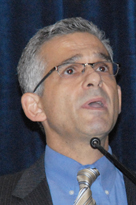 As of March 2010 there were more than 36,000 service members injured during OIF/OEF. When you consider that more than half of the active duty force is married, many with children, you realize there are significant numbers of families and children who are impacted by parental injuries of war. As of March 2010 there were more than 36,000 service members injured during OIF/OEF. When you consider that more than half of the active duty force is married, many with children, you realize there are significant numbers of families and children who are impacted by parental injuries of war.
We know, through research, that military children and families are generally strong and resilient. But we also know that military families and communities face challenges their civilian counterparts do not. Parental wartime injuries are an example. With a goal of facilitating and improving communication between health care providers and families, and within the family itself, especially in talking to children about war injuries, the Center for the Study of Traumatic Stress at the Uniformed Services University of the Health Sciences has initiated its “Courage to Care, Courage to Talk” campaign. The campaign is intended to assist hospitals and health care sites with connecting families to resources and providers in the hospital environment who can answer their questions, talk with them about their children, or address other family or communication concerns related to the injury. Expert consensus and professional involvement with military families and children of the wounded, many of whom visit and/or stay in or near hospitals and rehabilitation clinics for extended periods of time, has shown that beginning with the notification of injury, a cascade of events takes place that can raise family stress, lead to additional family separation, and raise child anxiety and worry about parental health and their own safety. Children may visit the hospital and need to be prepared for what they may see. Long term, families may need to manage with parental changes because of combat stress/PTSD related problems or complications related to traumatic brain injury. "Courage to Care, Courage to Talk" acknowledges the important role families play in the injury recovery process and the importance of family resilience, sustained parenting and appropriate communication about the injury with children of all ages to ensure their healthy development. In support of Month of the Military Child, I encourage you to be mindful of these military family concerns in your own practice and work to educate health care communities about the issues confronting military families and how best to address them. Enjoy this issue of MHS Vital Signs! Stephen J. Cozza, M.D.
Associate Director, Center for the Study of Traumatic Stress, USU April Is Month of the Military Child 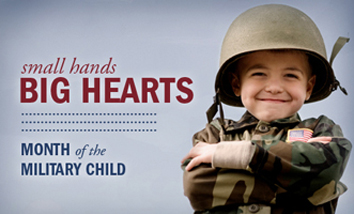 Military children often face stress related to deployments and time spent away from a parent. They may need additional support and guidance to ensure they thrive, from early childhood through adolescence. During April the Military Health System recognizes Month of the Military Child and offers resources for parents and family members who provide children with the care they need to grow and develop into maturity. Read more Ceremony Honors Fallen Medical Service Members 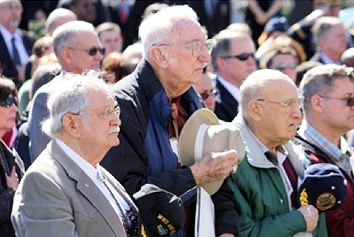 Army Cpl. Adam J. Fargo, a medic, was killed by a homemade bomb while on patrol in Iraq more than three years ago. But his memory was strong for his sister on March 16, when she wore his dog tags and a picture of him in uniform draped around her neck. "I love to honor him," said Sarah Fargo, whose father and two grandfathers stood by her side. "I love to see everyone honor him." Fargo was one of the more than 300 people who gathered at Arlington National Cemetery in March for the Military Health System’s 2010 Remembrance Ceremony dedicated to fallen military medical personnel. Set on a hill with a backdrop of white marble gravestones, the ceremony honored 244 medical service members – medics, corpsmen, nurses and doctors – who died in support of Operations Iraqi Freedom and Enduring Freedom from 2001 through Dec. 31, 2009. (Watch full video of the ceremony) Read more MHS Announces New Medal of Honor Site 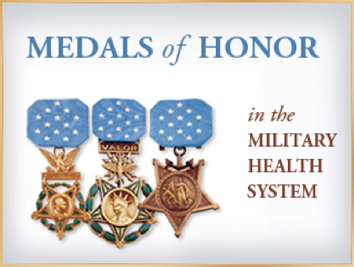 On March 25, the Military Health System joined the Congressional Medal of Honor Foundation in honoring those U.S. military medical personnel who have been recognized for the nation's highest military decoration, the Medal of Honor. "Since the Civil War, 80 military medical personnel have faced life-or-death decisions few will ever have to make," said Michael Kilpatrick, M.D., director of strategic communications for the MHS. "With only seconds to react, these brave heroes risked their lives in order to save the lives of others. For some of them, it was the last decision they ever made." The MHS recently created a Web page to recognize these service members and their selfless, daring displays of bravery. Click here to view Medal of Honor recipients. Do You Know Your Drinking IQ?  With each deployment, military personnel and their families face enormous challenges, and the stress and anxiety associated with separation can lead many to misuse alcohol. With each deployment, military personnel and their families face enormous challenges, and the stress and anxiety associated with separation can lead many to misuse alcohol.
April 8 was National Alcohol Screening Day but Miltary Pathways continues to encourage all service members and their families to complete a free, anonymous screening to assess their alcohol use and behaviors. "NASD is a wonderful way to promote alcohol awareness. It is an opportunity to provide soldiers with information and to explain to them what's normal and what's not when it comes to alcohol use," said Yvonne Wilbanks, Fort Benning Army Substance Abuse Program. Read more Warrior Care Spotlight: "Dizzy" Clinic Aids Soldiers With TBI Care 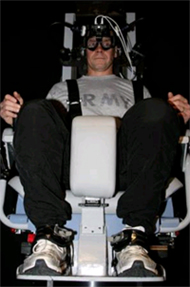 In March a multidisciplinary “dizzy” clinic at Walter Reed Army Medical Center celebrated its first year of treating active duty personnel who experience dizziness due to traumatic brain injury. The clinic opened last year to ensure that soldiers returning from deployment in Operation Iraqi Freedom and Operation Enduring Freedom are seen by specialty providers in a timely manner. In March a multidisciplinary “dizzy” clinic at Walter Reed Army Medical Center celebrated its first year of treating active duty personnel who experience dizziness due to traumatic brain injury. The clinic opened last year to ensure that soldiers returning from deployment in Operation Iraqi Freedom and Operation Enduring Freedom are seen by specialty providers in a timely manner.
Dizziness, headaches, visual impairment and changes in hearing are common signs and symptoms of TBI, according to the Defense and Veterans Brain Injury Center, headquartered at Walter Reed. Many of the “dizzy” clinic’s patients experience dizziness after sustaining injuries due to blast exposures from improvised explosive devices, land mines, mortar rounds and rocket-propelled grenades. Read more Raising Expectations in Military Medical Education Many military medical professionals are trained in the civilian sector prior to serving, but Uniformed Services University of the Health Sciences in Bethesda, Md., offers individuals, both with and without prior military service, the opportunity to study medicine. USU provides a unique approach to medical training, allowing its students to combine their passions for serving people and their nation. "We are developing future physician leaders who can perform in austere environments and under complex circumstances," said retired Navy Capt. Larry W. Laughlin, M.D., Ph.D., dean of the F. Edward Hébert School of Medicine at USU. "We need to ensure that our students, when they complete their education and hit the battlefields and military treatment facilities, are prepared to lead and be mentors, both in their military roles and as physicians. They may find themselves, right off the bat, in situations where their leadership will be called upon to make critical decisions that will save lives." Read more MHS Profiles: Saluting America’s Smallest Heroes 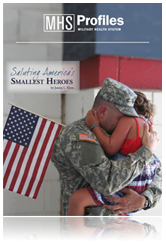 The April issue of MHS Profiles looks at the people and programs within the Department of Defense dedicated to the families and children of those who serve. The Office of the Deputy Undersecretary of Defense (Military Community and Family Policy) leads DoD's efforts to provide specialized services to meet the unique needs of military families and children. To learn more about how MC&FP partners with nonprofit organizations to ensure the well-being of military children, click here. The April issue of MHS Profiles looks at the people and programs within the Department of Defense dedicated to the families and children of those who serve. The Office of the Deputy Undersecretary of Defense (Military Community and Family Policy) leads DoD's efforts to provide specialized services to meet the unique needs of military families and children. To learn more about how MC&FP partners with nonprofit organizations to ensure the well-being of military children, click here.
Research Roundup  Research, medical publications and articles from peer-reviewed medical and scientific journals are a vital part of the Military Health System. Each month, MHS Vital Signs highlights notable research being conducted by the MHS and its counterparts. New Studies Reveal Genetic Changes That Lead to Cancer In 2005, University of Michigan medical researchers made the groundbreaking discovery that mutant fused genes play a role in many common cancers. In 2005, University of Michigan medical researchers made the groundbreaking discovery that mutant fused genes play a role in many common cancers. "These researchers have shifted the cancer paradigm with their discovery that gene fusion is not limited to blood cancers and that it can be related to androgen. Their science is outstanding and will help the military in our goal of moving to more effective, individualized medicine," said Col. Karl Friedl, director of the Telemedicine and Advanced Technology Research Center. Finding recurrent gene fusions for a specific type of cancer brings researchers closer to making a specific test for that cancer and offering novel ways to treat it – perhaps even personalized drugs with fewer side effects. Read more Did You Know? In just six years, almost a billion TRICARE Encounter Data records have been processed. It’s a milestone event for a system that has come a long way in quickly and efficiently processing data records around the world. Civilian providers complement the direct care provided at military treatment facilities for TRICARE beneficiaries worldwide. Rapid data record processing, courtesy of TRICARE Encounter Data, helps civilian providers get paid promptly for their services. Read more
The Military Health System (MHS) is a unique partnership of medical educators, medical researchers, and health care providers and their support personnel worldwide. The MHS is prepared to respond anytime, anywhere with comprehensive medical capability to military operations, natural disasters and humanitarian crises around the globe, and to ensure delivery of world-class health care to all DoD service members, retirees, and their families. To subscribe, unsubscribe, or manage your e-mail subscription options, including your preference for text or HTML formatted e-mails, click here. |